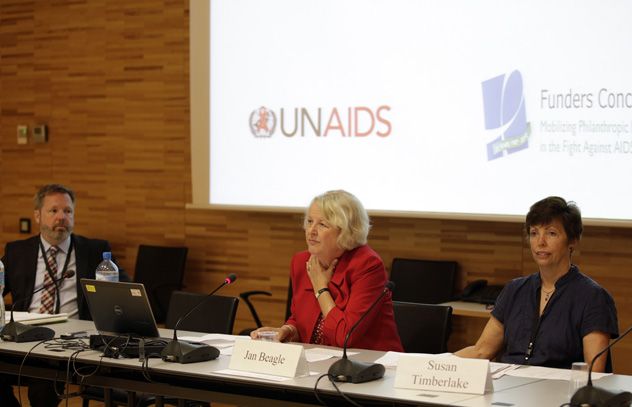

L to R: John Barnes, Executive Director, Funders Concerned about AIDS; UNAIDS Deputy Executive Director Jan Beagle; and Susan Timberlake, Chief, Human Rights Division at UNAIDS.
Debrief
Donors and partners commit to sustaining HIV and human rights programming as a stepping stone to ending the AIDS epidemic
17 June 2014
17 June 2014 17 June 2014Funding for HIV-related human rights work by civil society is insufficient and may be threatened even further. Research from UNAIDS, with the support of the Ford Foundation, indicates that, at present, less than 1% of annual funding for the global AIDS response supports human rights programming. Furthermore, funding appears to be dropping as donors move to new priorities, many countries move to middle income status and have reduced eligibility for external aid, and domestic funding fails to support human rights work.
In order to explore appropriate donor responses to human rights challenges, discuss the funding landscape for civil society organizations and articulate a shared commitment among donors to sustain human rights work related to HIV, UNAIDS and Funders Concerned About AIDS convened a meeting on 11 and 12 June in Geneva, Switzerland.
Participants expressed great concern about the diminishing support for civil society’s human rights work. Research indicates that civil society groups, which have led human rights work in the context of HIV, are under threat of downsizing or disappearing all together. In some places punitive and coercive approaches are increasing, while space for civil society is shrinking.
At the meeting HIV donors and human rights donors discussed how best to breakdown the silos between them. Private foundations considered how best to support innovative and cost-effective programmes to decrease stigma and discrimination, and increase access to justice in the context of HIV. And the Global Fund to Fight AIDS, Tuberculosis and Malaria (Global Fund) explained its commitment to increasing funding for programmes to address legal barriers to accessing HIV services. The meeting resulted in strategies and commitments to sustain the HIV-related human rights response in efforts to end the AIDS epidemic and promote human rights, dignity and social justice.
Participants
The meeting was co-convened by UNAIDS and Funders Concerned About AIDS, with the support of the Ford Foundation. Other partners included the Global Fund, the Open Society Foundations, the Elton John AIDS Foundation and the Fund for Global Human Rights. More than 60 participants from across the donor spectrum—HIV and human rights donors, multilateral and bilateral donors, private foundations, publicly funded intermediary foundations, and community-driven collaborative funds—attended. Communities and other civil society human rights implementers were also represented.
Key messages
- Human rights programmes are critical to achieving both the public health imperatives of the HIV epidemic and the realization of the human rights of the people affected.
- Bilateral donors, private foundations, the Global Fund and recipient governments all have important roles to play in ensuring the sustainability of the human rights response to AIDS.
- The Global Fund Secretariat is in a unique position to work alongside governments and civil society to increase investments in programmes aimed to promote human rights.
- The role of bilateral donors cannot be understated, both in terms of driving rights-based responses and in sustaining funding for human rights work.
- Private foundations have an essential role in providing critical funds for HIV-related human rights work, including advocacy and civil society mobilization efforts not covered by domestic or multilateral funding.
- UNAIDS and FCAA committed to convene bilateral, multilateral and private funders to facilitate collaborative approaches to support short-term emergency responses as well as the long-term sustainability of civil-society-led human rights response to HIV.
Quotes
"Sustaining the human rights response to HIV and advancing the broader rights movements of people living with HIV, and key populations at higher risk are at the heart of any efforts to end the AIDS epidemic. Zero new HIV-infections, zero discrimination and zero AIDS-related deaths represent tangible goals that can be achieved through concerted efforts to support continued human rights action by a strong civil society."
"The fact that only 1% of overall global AIDS resources address human rights programming offers a critical and urgent opportunity for private philanthropy to exercise its unique power to fund where others won't, and to mobilize civil society to hold all donors accountable to their commitments to fully fund efforts to combat those human rights abuses that have long fuelled the epidemic."



